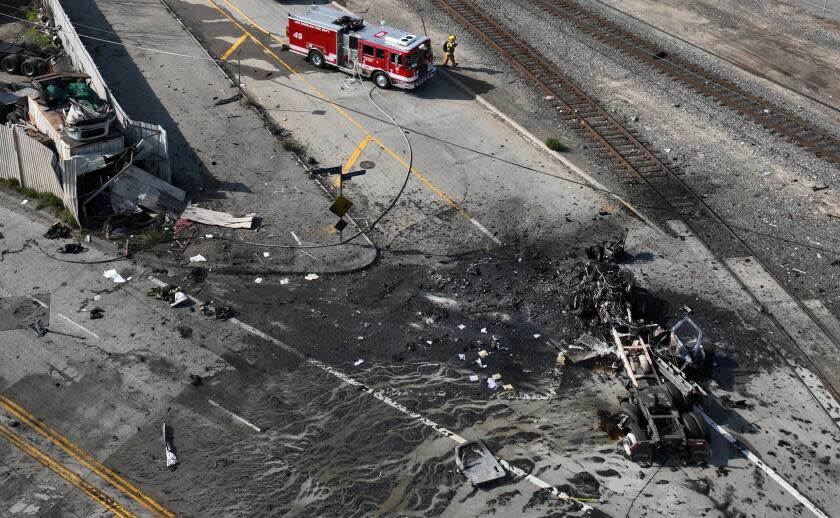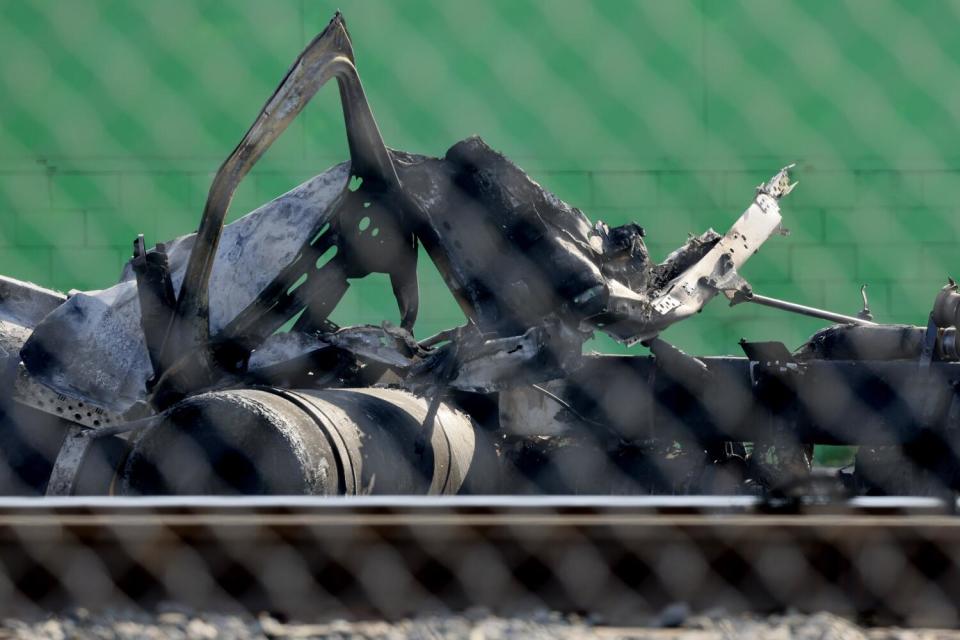Firefighters injured in Wilmington truck explosion file lawsuit

When Los Angeles firefighters arrived at the scene of a vehicle fire earlier this year in Wilmington, they found a semi-truck fully engulfed in flames.
But they were unaware that the truck was a ticking time bomb.
Firefighters had positioned their vehicles around the fire that was burning two large compressed natural gas tanks that helped power the vehicle. Minutes later, the truck exploded, injuring nine firefighters, including two critically, according to a new lawsuit filed against the trucking company and others.
Seven of the firefighters filed the lawsuit, which also names the manufacturer of the gas tanks and fuel system along with the truck driver, on Tuesday in Los Angeles County Superior Court.
The firefighters accuse Costa Mesa-based Hexagon Agility, Daimler Truck North America and several other companies with negligence, strict product liability over the design of the tanks used to transport the compressed natural gas and similar complaints for damages.
The Los Angeles Fire Department responded to a report of a truck fire on North Alameda Street shortly before 7 a.m. on Feb. 14. Firefighters arrived and parked their trucks from 50 to feet 250 feet from the burning vehicle, according to the lawsuit.
Firefighters followed their standard procedures for a vehicle fire, with a nozzleman positioned on the west side of the vehicle applying water. In about six minutes, the fire was almost put out and water was applied from the east side. During all of these standard procedures, firefighters did not know the contents of the tanks on the burning vehicle, according to the complaint.
The subsequent explosion rattled the Wilmington neighborhood, with the blast sending up a plume of black smoke and a fireball large enough to damage a transformer on a nearby power line. Firefighters were knocked down by the explosion and some were badly burned, according to the complaint.
The firefighters "were hurt and physically injured, sustaining medical bills, loss of earnings/earnings capacity, pain, suffering, loss of enjoyment of life and other damages, and will continue to sustain such damages in the future," according to the complaint.
When the initial 911 call was made about the fire there was no information about the compressed natural gas, the complaint says. The truck's driver, Shania Janea Sutton, also did not warn firefighters about the truck's cargo when they arrived on the scene, and there was no written warning on the tanks.
The firefighters who filed the lawsuit are Andres Saenz II, Casey Dunn, Daniel Goen, Howard Weiserweaver, Ian Gallardo, Robert Ward and Tom Rodriguez. They claim the compressed natural gas was stored in a tank with design and warning defects. These defects made the tank "unsafe and dangerous for use by the consumer," according to the complaint.

The plaintiffs said that the defendants were aware of the dangers if the tanks were mishandled.
The firefighters are represented by attorney Matthew McNicholas.
“It is unacceptably dangerous that a truck running on compressed natural gas can fail like this, exploding in the middle of a city street like a bomb as opposed to releasing pressure safely,” McNicholas said in a statement. “This would not have occurred had the product not had hidden defects preventing the safe release of pressure.”
Daimler Truck North America said it does not comment on pending litigation. Hexagon Agility did not immediately respond to requests for comment.
This story originally appeared in Los Angeles Times.

